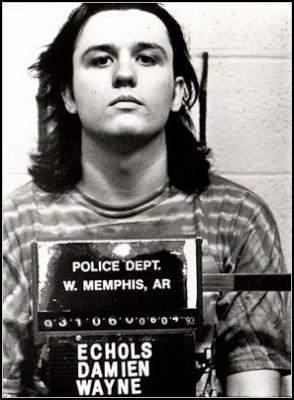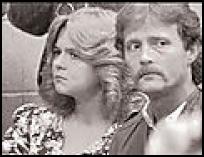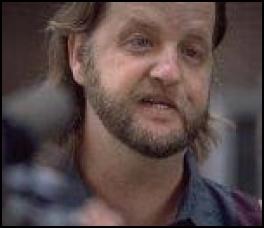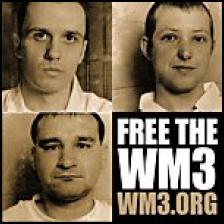Breakthrough for the West Memphis Three
Breakthrough for the West Memphis Three
By Gordon Campbell

Damien
Echols
The West Memphis Three murder case is back in court today. Gordon Campbell begins a two part overview, via an exclusive interview with Arkansas journalist Mara Leveritt, the author of the definitive book on the case.
A few paces south of the entrance to The Mill liquor store on Willis Street in Wellington, someone has stencilled "Free the West Memphis Three" on the pavement, and the same message crops up several times on nearby Cuba St as well. Clearly, someone in Wellington felt strongly enough to go out and publicly attack the verdicts handed down in an Arkansas courtroom fourteen years ago, in a miscarriage of justice still being played out today.
On May 6, 1993, the hogtied, naked and beaten bodies of three 8 year old children - Steven Branch, Christopher Byers and Michael Moore - were found dumped in a drainage ditch in the Robin Hood Hills in West Memphis, Arkansas. Early in 1994, two teenagers called Jason Baldwin and Jessie Misskelley were sentenced to life imprisonment for the crime, while a third, Damien Echols, was sentenced to death by lethal injection.
A fresh hearing on the case has been called for April 14. A few weeks ago, I got an update from Arkansas journalist Mara Leveritt, author of the Devil's Knot definitive book on the case. That interview is printed below.
First, some background. The evidence presented at the original trials of Echols, Baldwin and Misskelley was circumstantial. No physical evidence credibly linked them to the scene in Robin Hood Hills, or indicated they had ever met the victims. Three bogus "confessions" form the kernel of the prosecution case - and they fed into and reflected the mood of quasi-religious fear and frenzy that has swirled around the case from its beginnings.
Unfortunately, the key events in the WM3 case have unfolded within a community that had little trouble in believing that Satan is real and at work in the world, and that the three children were killed in a ritual sacrifice to the Devil. That, in essence, was the prosecution case - though the state prosecutors never did risk putting Satan on the witness stand, for cross-examination.
Echols in particular, became a target. He wore a black trench coat even in warm weather, rented books on paganism from the local library, listened to Metallica and other heavy metal bands, and wrote doomy, melodramatic poetry. Echols had received treatment for depression, and been briefly hospitalized. At 19, he also exuded an air of bored teenage defiance that did him no favours in the courtroom. Taken together, that was about all it took to make Echols a prime suspect - and from there, it proved a fairly short journey to death row.

A key factor in the convictions was a "confession" made by Jessie Misskelley, a borderline retarded 17 year old with an IQ of only 72, who proved highly suggestible. The confession had been wrung from Misskelley after a 12 hour police interrogation only part of which was recorded, and which was conducted without his lawyer being present through-out.
The confession was demonstrably false on key details. It claimed the children and Baldwin were absent from school on the May 5th day the children were abducted, when all were present. It placed the killings as occurring at noon on May 5th, though the children were seen five to six hours later. It described how the children were raped - when they weren't - and that Misskelley had seen Echols choke Chris Byers with a wooden stick, though no such injury was inflicted on any of the victims.
Furthermore, It described Baldwin and Echols inflicting savage beatings while the children were clothed, though their clothing had no rips, tears or blood stains. The confession also related that the boys were tied up with brown rope, when they were tied hand to foot with their own shoelaces.
When police pointed out that "noon" on May 5th couldn't be right, Misskelly obliged by shifting the killing time to 5-6 pm, and when that also didn't fit the necessary timeframe, Misskelley agreed with a police suggestion that it would have been around 8pm. At the outset, the police suggested that Misskelley's co-operation could earn him a share in the reward, sufficient to buy his own truck.
Understandably, the state didn't want Misskelley tried together with his co-defendants, which would have exposed the confession to cross examination, and demolition. So Misskelley was tried first, followed a few weeks later by Echols/Baldwin together.
It wasn't quite the Salem witch trials but it came close. Several jurors and prospective jurors at the Echols/Baldwin trial said they already knew about the case from the media coverage - Misskelley's trial had been widely reported - and some indicated they personally believed the defendants guilty, even before the trial began.
It gets worse. Three jurors - including the jury foreman - have since sworn in affidavits filed in 2004 that the jury had ignored an explicit direction from presiding Judge David Burnett that they should take no notice of a witness' reference to the Miskelley confession, and strike from their minds anything they knew about it.
In fact, the affidavits and juror notes reveal that the Misskelley confession played a central role in the jury deliberations. This happened without the defendants being given the chance to challenge this confession in court, or to cross-examine Misskelley about its authenticity. Therefore, Echols and Baldwin were arguably denied their constitutional right to a fair trial, on grounds of jury bias alone - and that point does now form part of the legal campaign for a retrial.
Fourteen years down the track, there is some reason to hope that justice may finally be done. On 27 October 2007, Echols' lawyers filed a massive legal brief containing fresh forensic evidence and the results of DNA tests belatedly carried out on material from the children's bodies, and the site where they were found. None of this DNA evidence links Echols, Baldwin or Misskelley to the boys, to their injuries or to the site - but it does link Terry Hobbs, the stepfather of Steven Branch.

Terry Hobbs
Depending on your point of view, the DNA is either momentous, or inconsequential. The test results do reveal the presence of a hair, linked by mitochrondite DNA to Hobbs, in the ligature used to tie up Michael Moore - who was not his child. Another hair from a nearby tree stump has chromosomal DNA links to Hobbs' friend, David Jacoby. Since Hobbs visited Jacoby on May 5th, this could have been by contamination or, as the state argues, be on the stump because Jacoby took part in the search for the victims The entire legal brief is worth reading, and has been formatted for easier access.
As mentioned, Judge Burnett has set April 14 as the date for a fresh hearing into the case. Most New Zealanders know about the WM3 case through the two excellent Paradise Lost HBO documentaries made by Joe Berlinger and Bruce Sinofsky, who went on to make the Some Kind of Monster doco with Metallica.

John Mark Byers from the film Paradise Lost 2
For years, the Paradise Lost films have raised plausible suspicions about the highly volatile John Mark Byers, the stepfather of Chris Byers. Last year, Byers changed sides and he has recently been presenting himself in the media as a public champion of the WM3's innocence.
Leveritt refers in the interview below to a "confession" Baldwin is claimed to have made in jail to the police informant Michael Carson. Again, this interview is highly suspect and open to charges of being solicited - it surfaced months after it allegedly occurred and three weeks before the trial.
Should we be skeptical? Yes. To quote from Echols legal brief of last October, taped conversations between jailhouse cellmates are the only reliable form of such evidence, for obvious reasons. "[But] when such a informant comes forward after a deluge of publicity concerning a notorious crime; when he claims to have heard had a confession in jail by an accused whom the informant just met; when that defendant has confessed to no one else; when the informant failed to report the confession until months later; and when everything the informant claims to have learned from the accused has been reported in the media, that testimony is inherently unworthy of belief."

Mara Leveritt
The interview with Mara Leveritt now follows:
Campbell : In January this year, Arkansas Attorney-General Dustin McDaniel indicated that he saw no DNA evidence justifying a retrial or pardon. What legal grounds remain to be exhausted at state level before the case for a retrial can be addressed at federal level - and why should we think the federal courts will treat the issues any differently?
Leveritt : As I understand it, in the case of Damien Echols, the only state issues to be resolved concerns possible new evidence arising from DNA testing. A federal judge has told state officials to expedite this process, but attorneys for both Echols and the state have said that they are not prepared to address new evidence at the hearing that is scheduled before Judge Burnett on April 14.
I am not clear on what will be
presented at that hearing. Supporters of the WM3 hope that
if Echols' case reaches a federal court, the appellate
justices there might order a new trial because, since they
are appointed rather than elected, they would presumably
take a
less political view of the proceedings. Jason
Baldwin and Jessie Misskelley are far behind Echols in their
appeals, as neither man has yet had even a single
post-conviction hearing. Therefore, all of their state
appeals remain to be pursued.
Q. In your opinion, is it sound tactics to continue to mount the main legal challenges on behalf of Damien Echols - presumably on the basis that victory for him will benefit all three equally - or do you think separate challenges need to be mounted on behalf of Jason Baldwin and Jessie Misskelley, and if so, on what separate grounds?
I believe that simultaneous appeals should be mounted for all three men for two reasons. First, all deserve that shot at freedom. And second, a successful attack on any of the cases would seriously damage the others. The assault on Misskelley's conviction would focus on the circumstances under which police obtained his confession.
Baldwin would argue, I believe, that he deserves a new trial because his attorney was ineffective to the point of dereliction, particularly by calling only one witness on behalf of his client, who was on trial for his life. In my view, the state's case against Baldwin was thin to the point of non-existence and Baldwin has a good case that his lawyer's failure to attack it warrants a new trial. I believe if efforts had been made to achieve this, a new trial might have been ordered for Baldwin already, and if that had happened, the state's case against Echols and Misskelley might also now be fatally weakened.
Tactically, what role can the DNA evidence - which showed no crime scene links to the WM3, while linking Terry Hobbs - realistically play in future, given the state will argue that the original verdicts were based on a BODY of circumstantial evidence ?
Again, as I understand it, the attorney general has expressed support for the original verdicts based on his observation that -- by law, if not common sense--all three defendants have confessed to the murders. The state will argue that Misskelley confessed to the police; Baldwin confessed to Michael Carson, the so-called jailhouse snitch; and Echols confessed to the girls who testified that they heard him admit to the murders at a softball field.
The statements of Carson and the
"softball girls" qualify as
confessions, according to
Arkansas law. If the state pursues this line of reasoning,
the DNA evidence that's been announced so far would
presumably have little effect.
Q. In your opinion, does the change of stance towards the WM3 by John Mark Byers signal a genuine change of heart, or an opportunistic response to shift the burden of suspicion to Terry Hobbs?
I try not to speculate.
Q. What is the current state of the Dimension Films film production of The Devils Knot ?
I will leave announcements about that to the producers.
Q. John Mark Byers, Terry Hobbs and the unknown 'Bojangles' figure have all been cited as credible alternative suspects. In your view, was the police investigation of these alternatives adequately conducted - and can you briefly indicate in what respects the police investigation of those options fell short of acceptable standards ?
The families of the victims were not interviewed or investigated as they should have been in the immediate aftermath of the murders. When the knife that Byers gave to the HBO crew [ ie, the makers of the Paradise Lost films ] was found to have human blood in its fold, the police questioning of Byers was tentative and inept.
I also questioned the apparent reluctance of police and prosecutors to pursue a known case of theft against Byers that coincided with the murders, as well as Judge David Burnett's willingness to expunge a prior conviction he had for terroristic threatening of his ex-wife, despite the fact that Byers had violated the requirements the court imposed at his sentencing for that crime.
Hobbs, we now know, was charged in another Arkansas city with assaulting an elderly neighbor years prior to his stepson's murder. If this fact was uncovered by West Memphis police, that information did not enter its investigative file.
Of course, the [police] department's handling of evidence surrounding the bloody and muddy man who entered the Bojangles restaurant on the night of the murders is simply outrageous. With three children known to be missing in the area, an officer dispatched to the restaurant did not bother to go inside. When detectives did go to the restaurant, after the bodies were found, they collected evidence which they testified they later lost.
Americans are familiar with defense lawyers being able to attack the quality of a police investigation at trial, as was seen famously in the case of O.J. Simpson. But in the West Memphis murder case, Judge Burnett said that the police were not on trial and would not allow any questions relating to police competence.
Reportedly, while misgivings have spread about the conduct of the trials, the majority view in Arkansas still maintains that the guilty were convicted. Do you feel at all disheartened by this situation, given that this makes it that much easier for the state to deny its errors ?
A. Public opinion in Arkansas has changed drastically in the past few years. A recent TV poll, though admittedly unscientific, showed a slight majority in central Arkansas believing that Echols, Baldwin and Misskelley are innocent.
I do believe that, just as the trials occurred amid an atmosphere of intense public belief in their guilt, the appellate process will be colored by public opinion. The very fact that our attorney general felt it necessary to issue a statement about this case, even before the scheduled hearing, shows the effect of the changing environment. INTERVIEW ENDS.
In the wake of the release of the DNA evidence last year, the mainstream media once again turned its attention to the WM3 case. In December 2007 CNN's Larry King carried out a lengthy jailhouse interview with Damien Echols, now 33, only part of which is now readily available online.
Not all of the recent news has been welcome. In January, Leveritt and Echols' original lawyer Dan Stidham ( who features prominently in the Paradise Lost movies) became involved in a dispute with Echols' wife, Lorri Davis, who runs the WM3 website , which has been a campaign focal point for many years.

There is no suggestion of financial impropriety. The conflict is over transparency in how WM3 donations are being spent, and whether the tactical focus on Echols - he is after all, under a death sentence - has been to the detriment of Baldwin and Misskelley, and thereby to the case overall. Leveritt and Stidham have now founded their own WM3 Injustice Project site which contains further information on this dispute.
As the case moves into its hopefully final stages the cost of justice is mounting steeply. Donations to the defence can be forwarded via money orders made out to:
Damien Echols Defense Fund
PO Box 1216 - Little Rock,
AR 72203
USA
as detailed on the main WM3 site above, or they can be forwarded via instructions on the Leveritt/Stidham site, also cited above.
Tomorrow: The softball girls, the Bojangles man and other suspects, and the legal strategy forwards.
Gordon Campbell is a former Listener journalist, and editor of Scoop's election coverage, Pulse08.


 Gordon Campbell: On Wealth Taxes And Capital Flight
Gordon Campbell: On Wealth Taxes And Capital Flight Ian Powell: Why New Zealand Should Recognise Palestine
Ian Powell: Why New Zealand Should Recognise Palestine Binoy Kampmark: Squabbling Siblings - India, Pakistan And Operation Sindoor
Binoy Kampmark: Squabbling Siblings - India, Pakistan And Operation Sindoor Gordon Campbell: On Budget 2025
Gordon Campbell: On Budget 2025 Keith Rankin: Using Cuba 1962 To Explain Trump's Brinkmanship
Keith Rankin: Using Cuba 1962 To Explain Trump's Brinkmanship Binoy Kampmark: The Killing Of Israeli Embassy Staffers - Netanyahu’s Antisemitism Canard
Binoy Kampmark: The Killing Of Israeli Embassy Staffers - Netanyahu’s Antisemitism Canard